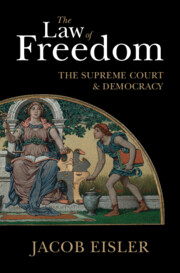
- Publisher:
- Cambridge University Press
- Online publication date:
- July 2023
- Print publication year:
- 2023
- Online ISBN:
- 9781108304269


The Supreme Court has been at the center of great upheavals in American democracy across the last seventy years. From the end of Jim Crow to the rise of wealth-dominated national campaigns, the Court has battled over if democracy is an egalitarian collaboration to serve the good of all citizens, or a competitive struggle by private interests. In The Law of Freedom, Jacob Eisler questions why the Court has the moral authority to shape democracy at all. Analyzing leading cases through the lens of philosophy and social science, Eisler demonstrates how the soul of election law is a battle between two philosophical understandings of democratic freedom and popular self-rule. This remarkable book reveals that the Court's battle over democracy has shaped how Americans rule themselves, marking election law as the most dramatic judicial intervention in constitutional history.
‘In this powerfully argued and beautifully clear work, Jacob Eisler gives us a framework for understanding a dilemma at the core of modern liberal democracy. Though the ‘counter-majoritarian difficulty' is familiar, Eisler introduces the more troubling ‘counterpopular dilemma': how can courts police democratic processes. Through a careful exposition of the ideals of election law in light of the principles of democracy, Eisler provides an essential guide to making courts safe for democracy. More importantly, he gives us a map for remaking a democracy that might live up to its ideals.'
Lawrence Lessig - Harvard Law School
‘Election law has long ignored a question that should be at its core: Why should unaccountable judges – not the regular political process – decide the kind of democracy we live in? This sophisticated book, grounded in both democratic theory and legal doctrine, finally focuses on judicial review of electoral regulation. Its persuasive claim is that courts' role in this area must be forever unsettled, always grappling with disputes among different theories of liberty and equality but never definitely resolving them.'
Nicholas Stephanopoulos - Harvard Law School
‘Eisler draws on important doctrines in the the philosophy literature to inform what had been an intractable debate about the legitimacy of judicial review over the democratic process. The book is a must read for anyone seeking a theoretically sound justification for why the interests of the people must be paramount when courts resolve questions implicating democratic design, rights, and governance.'
Franita Tolson - University of Southern California Gould School of Law
 Loading metrics...
Loading metrics...
* Views captured on Cambridge Core between #date#. This data will be updated every 24 hours.
Usage data cannot currently be displayed.